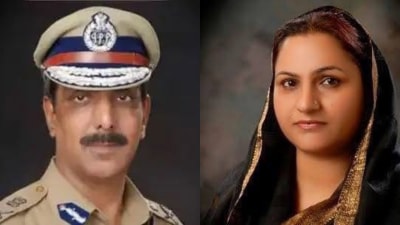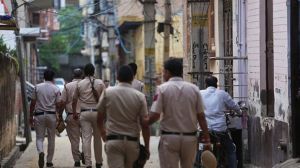SP’s rising star who gave up her dream of becoming a judge, Priya Saroj follows in father’s footsteps
The 25-year-old who is Dalit says continued discrimination against her community motivated her to think about a career in politics
 Priya Saroj with Samajwadi Party chief Akhilesh Yadav. (Photo Credit: Facebook)
Priya Saroj with Samajwadi Party chief Akhilesh Yadav. (Photo Credit: Facebook)When the Samajwadi Party (SP) named her as its candidate in Machhlishahr, Uttar Pradesh, for the Lok Sabha elections, 25-year-old Priya Saroj, a law graduate, was preparing for judicial service exams.
Despite hailing from a family of politicians — her father Tufani Saroj is a three-time MP and is currently the MLA from Kerakat — she was not looking to get into active politics. Saroj felt that the chair of a judge could be more effective in delivering justice to her community: Dalits.
On June 4, as she was declared the winner from Machhlishahr, her father’s former constituency, she was catapulted from the desired role of adjudicating the law to the actual role of framing it.
“Though my father is a seasoned politician and has won Lok Sabha polls consistently between 1999 and 2014, I never thought of becoming a politician while growing up. After graduating in law, I started preparing for judgeship exams during the Covid-19 pandemic. Even when my ticket was announced, I was taking online classes for the exams,” Saroj, a first-time MP, told The Indian Express.
Saroj got her first taste of politics when she campaigned for her father in Kerakat during the 2022 Uttar Pradesh Assembly elections. “People liked the fact that despite staying in Delhi, I could speak the local language, understood issues and was confident yet simple. People told my father that I should be pushed into politics. Also, the continued discrimination against Dalits that I saw in villages motivated me to think about politics as a career,” Saroj said.
Dismissing the allegations of “dynasty politics”, she said, “My grandfather was a farmer who faced discrimination as a Dalit in his village. He had to leave his village because of it and settle down along with others from his community on barren land which later became Kataharwa, my native village.”
Saroj said her father used to work in Mumbai but came back to Uttar Pradesh in the 1970s to participate in the movement led by socialist leader Jayaprakash Narayan against the Indira Gandhi-led Congress government. “My father has risen from the ground and seen extreme poverty. It is easy to call me a nepo kid. But I know the struggles that my father and grandfather have gone through to bring us here,” she said.
Saroj said despite her father’s stature as an MP and a politician of significant standing in the SP, she and her four siblings were brought up in a middle-class environment. She grew up in the accommodation provided to her father as an MP in Delhi and attended the Air Force Golden Jubilee School in the city.
Following her father’s defeat in Machhlishahr in the 2014 Lok Sabha polls, the family moved to an apartment in Delhi’s Dwarka neighbourhood. She studied at Maitreyi College at the University of Delhi and then law at Amity University.
“My father used to spend most of his time in his constituency while we lived in Delhi. But whenever he met us, he told us the stories of his life’s struggle. These stories became a source of inspiration for me,” Saroj said, adding that she got the Machhlishahr based on her father’s “work in the constituency, his loyalty to the party and his clean image”.
“Rashtriya Adhyaksh (SP chief Akhilesh Yadav) felt that the party needed a woman face from the Dalit community and he believed that as a lawyer I could speak well,” said the first-time parliamentarian.
Recalling her participation in her first-ever parliamentary session last month, Saroj said that she had never “participated in a protest as a student as her college did not even have a union”. “And here I was, shouting slogans for three long hours. It was a legitimate protest as the Speaker belongs to all and he must give equal opportunity to all to put forth their views,” she said.
The grind of being a public representative is slowly sinking in for the 25-year-old. “I hold a three-hour public hearing at 9 am in my constituency every day. There is a constant stream of people with all sorts of complaints, mostly related to land issues and the administration turning a deaf ear to their problems. I realise that the entire system is corrupt. Instead of going to the thana (police station), people have to knock on the doors of public representatives,” she said.



- 01
- 02
- 03
- 04
- 05




























